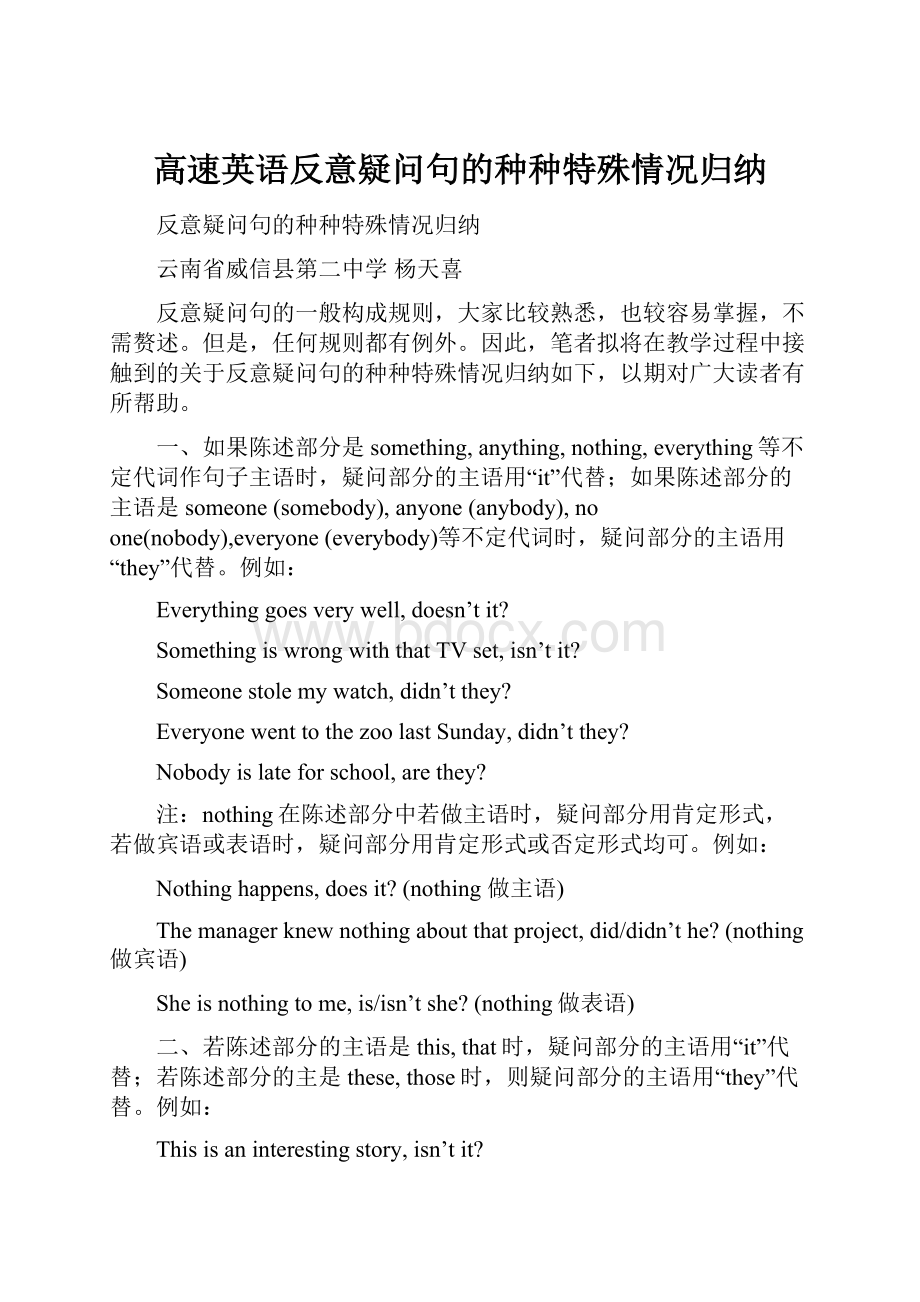高速英语反意疑问句的种种特殊情况归纳.docx
《高速英语反意疑问句的种种特殊情况归纳.docx》由会员分享,可在线阅读,更多相关《高速英语反意疑问句的种种特殊情况归纳.docx(10页珍藏版)》请在冰豆网上搜索。

高速英语反意疑问句的种种特殊情况归纳
反意疑问句的种种特殊情况归纳
云南省威信县第二中学杨天喜
反意疑问句的一般构成规则,大家比较熟悉,也较容易掌握,不需赘述。
但是,任何规则都有例外。
因此,笔者拟将在教学过程中接触到的关于反意疑问句的种种特殊情况归纳如下,以期对广大读者有所帮助。
一、如果陈述部分是something,anything,nothing,everything等不定代词作句子主语时,疑问部分的主语用“it”代替;如果陈述部分的主语是someone(somebody),anyone(anybody),noone(nobody),everyone(everybody)等不定代词时,疑问部分的主语用“they”代替。
例如:
Everythinggoesverywell,doesn’tit?
SomethingiswrongwiththatTVset,isn’tit?
Someonestolemywatch,didn’tthey?
EveryonewenttothezoolastSunday,didn’tthey?
Nobodyislateforschool,arethey?
注:
nothing在陈述部分中若做主语时,疑问部分用肯定形式,若做宾语或表语时,疑问部分用肯定形式或否定形式均可。
例如:
Nothinghappens,doesit?
(nothing做主语)
Themanagerknewnothingaboutthatproject,did/didn’the?
(nothing做宾语)
Sheisnothingtome,is/isn’tshe?
(nothing做表语)
二、若陈述部分的主语是this,that时,疑问部分的主语用“it”代替;若陈述部分的主是these,those时,则疑问部分的主语用“they”代替。
例如:
Thisisaninterestingstory,isn’tit?
Thoseareyourclassmates,aren’tthey?
三、若陈述部分的主语是动词不定式、动名词及从句时,疑问部分的主语用“it”代替。
例如:
TolearnEnglishwellisveryimportant,isn’tit?
Seeingisbelieving,isn’tit?
Whatweneedmostnowismoremoney,isn’tit?
四、若陈述部分的主语是one时,疑问部分的主语常用“one”代替,偶尔用“you”代替。
例如:
Onecan’tknowwhatwillhappeninthefuture,canone?
/canyou?
Oneshouldlearnmoreknowledgenow,shouldn’tone?
/shouldn’tyou?
五、若陈述部分是“Therebe”句型结构时,疑问部分的主语用“there”;若“there”是和其他成分构成倒装句型时,疑问部分则根据主语的人称和数的一致原则而定。
例如:
Therearesomeforeignteachersintheirschool,aren’tthere?
Therewillbeafootballmatch,won’tthere?
Theregoesthebell,doesn’tit?
Therecomesthebus,doesn’tit?
Therestand/lieseveraltallbuildingsatthefootofthemountain,don’tthey?
六、若陈述部分是由neither…nor…,either…or…,both…and…,notonly…butalso…等连词连接的两个名词或代词做句子主语时,疑问部分的主语用复数代词代替。
例如:
BothLucyandLilycametothisparty,didn’tthey?
NotonlyKatebutalsoJanelikesdancing,don’tthey?
EitheryouorLiPingisgoingtothemeeting,aren’tyou?
七、若陈述部分的主语是“the+形容词”表一类人时,疑问部分的主语用代替;若是表某一抽象概念时,疑问部分的主语用“it”代替。
例如:
Thericharenotalwaysveryhappy,arethey?
Theyoungshouldrespecttheold,shouldn’tthey?
Thebeautifulisn’talwaysgood,isit?
八、有时,陈述部分的主语是单数还是复数,较难判断,判断清楚以后,疑问部分的主语在人称和数方面要与陈述部分的主语保持一致。
例如:
Oneofthepolicewomenisstandingoverthere,isn’tshe?
Theactressanddirectordecidestosingusasong,doesn’tshe?
Thewriterandtheteacherwillcometogiveusatalknextweek,won’tthey?
Herbrother’snameisLiMing,isn’tit?
九、当陈述部分是由“I’msurethat;I’mafraidthat;Wearesurethat;Weareafraidthat;Ifeelsurethat;Ihopethat;Wefeelsurethat;Itseemsthat”等句型构成时,因主要意思在从句,故疑问部分的主语要与从句的主语保持一致。
例如:
I’msurethatyouknowhimwell,don’tyou?
I’mafraidthathehasn’tfinishedthatwork,hashe?
Ihopeyoudon’tmindmyspeakingfrankly,doyou?
Itseemsthatyouareanexpert,aren’tyou?
十、若陈述部分以第一人称主语“I/Wedon’tthink(expect,believe,guess,imagine,suppose等+that-clause”时,反意疑问句要与从句保持一致;若陈述部分是由其他人称代词做主语,反意疑问句则仍与主句保持一致。
例如:
Idon’tthinkthatshecancome,canshe?
Wedon’tthinkthatitwillraintomorrow,willit?
Theydon’tthinksheknewanythingaboutit,dothey?
Hedoesn’tsupposethatyouareagreatsuccess,doeshe?
Youdon’tthinkthatIcanswim,doyou?
十一、有时,虽然陈述部分用第一人称代词做句子主语,但反意疑问句的疑问部分是表示征求别人的意见,此时,反意疑问句的疑问部分实际上相当于另一个句子,含义相当于What\Howaboutyou?
或者Whatdoyouthink?
.注意仔细体会。
例如:
Ifindthislessonistoodifficult,don’tyou?
(=What/Howaboutyou?
)
Ibelieveheisright,don’tyou?
(=Whataboutyou?
)
Ithinksheisveryfriendlytous,don’tyou?
(=Whatdoyouthink?
)
Idon’tsupposehewillwinthisgame,doyou?
(=Whatdoyouthink?
)
十二、若陈述部分是“Iam…”时,疑问部分用“aren’tI”?
若陈述部分是“I’mnot…”时,则疑问部分用“amI?
”.例如:
Iamfoolish,aren’tI?
I’mnotcarefulenough,amI?
十三、若陈述部分为“I/Wewish…”时,反意疑问句的疑问部分用“mayI/we?
”;但若句子主语是第二、三人称代词时,反意疑问句的疑问部分则根据人称代词选择适当的助动词。
例如:
IwishtovisittheGreatWall,mayI?
IwishIcouldflytothemoononeday,mayI?
Tomwishestogoabroad,doesn’the?
Youwishtomakefriendswithus,doyou?
十四、若陈述部分含有否定意义的词如“no,never,seldom,hardly,none,few,little,rarely,scarcely,neither,neither…nor…,too…to…”等时,反意疑问句的疑问部分则用肯定形式。
例如:
HehasneverbeentoBeijing,hashe?
Thereislittlerainthisyear,isthere?
Heistooyoungtolookafterhimself,ishe?
Sheisseldomlateforschool,isshe?
注1:
在"too…to…”句型中若用形容词"glad,pleased,ready,eager”等时,不适用这一原则,因为此时并非表示“否定“含义,对于这点要特别注意。
例如:
Heistooeagertojointhearmy,isn’the?
Sheistoogladtoreceiveadoctor’sdegree,isn’tshe?
注2:
若否定含义是通过使用前缀(如:
un-,in-,im-,dis-,)和后缀(如-less,)等构成时,其反意疑问句的疑问部分仍用否定形式。
例如:
Youareunfair,aren’tyou?
Hedislikestheseways,doesn’the?
十五、若陈述部分"have"表“所有”含义时,疑问部分可用“have”或“do”的相应形式;若表示“经历、遭受、得到、吃”等含义时,疑问部分只能用“do”的相应形式。
例如
Hehasanewcar,hasn’t/doesn’the?
Theyhaveameetingeveryweek,don’tthey?
Shehadhisbikemendedyesterday,didn’tshe?
Youallhadagoodtimeattheparty,didn’tyou?
十六、若陈述部分含有“got”表“havegot”之意是,疑问部分既可用“haven’t”,也可用“didn’t”.例如:
Hegot(=hasgot)achancetogoabroad,didn’the?
/hasn’the?
Igot(=havegot)arighttoknowthisthing,haven’tI?
/didn’tI?
十七、若陈述部分含有“haveto…”这一句型结构时,其疑问部分要根据句意用助动词do的适当形式。
例如:
It’sdark,wehavetowalkhome,don’twe?
Shehastolookafterhersisterathome,doesn’tshe?
Hehadtomakealivingbyhimself,didn’the?
十八、在陈述部分中,Let’s引导的祈使句若是肯定句,疑问部分用“shallwe?
”;Let’s引导的祈使句若是否定句,疑问部分用“OK?
”或“allright?
”.例如:
Let’sgotoschool,shallwe?
Let’snotgotoseethefilm,OK?
/allright?
注:
Let’s引导的祈使句若是肯定句,疑问部分间或可用“shan’twe?
”,但含义和”shallwe”有区别。
试比较:
Let’sgodancing,shall↗we?
咱们去跳舞,好吗?
(征求意见,读时用升调。
)
Let’sgodancing,shan’t↘we?
咱们该去跳舞了吧?
(提醒对方,读时用降调。
)
十九、陈述部分若为let或其他动词开头的肯定祈使句,表“请求”时,疑问部分用willyou?
若表示“邀请”、“劝告”等时,则疑问部分用won’tyou?
(间或用may/canyou?
);陈述部分若为否定祈使句时,疑问句部分用willyou?
.例如:
Letmehelpyou,willyou?
(表“请求”.)
Pleaseopenthedoor,willyou?
(表"请求”.)
Haveacupoftea,won’tyou?
(表“邀请”)
Don’tbelateforschoolnext,willyou?
Don’treadinthesun,willyou?
二十、若陈述部分含有表“推测”意义的情态动词“can”时,其反意疑问句的疑问部分要根据情态动词之后的实义动词的人称、时态而定。
例如:
Jackcan’tbeinthereadingroom,ishe?
(can’tbe“表一般现在时。
”)
Hecan’thavegonehome,hashe?
(can’thavegonehome表“现在完成时”)
Shecan’thavegonetothepartylastnight,didhe?
(can’thavegonetothepartylastnight表“对过去情况的猜测”。
)
二十一、若陈述部分有情态动词“must”时,要根据具体情况而定。
分述如下:
A、must作“应当”解时,疑问部分用mustn’t.例如:
Imuststartatonce,mustn’tI?
B、must作“必须”解时,疑问部分用needn’t.例如:
Wemuststartearliertomorrow,needn’twe?
C、Must表“推测”,作“想必、一定”解时,疑问部分则根据must之后的实义动词的时态来确定。
例如:
Shemustbeanewteacher,isn’tshe?
(mustbe表“一般现在是”)
Theymustbeplayingbasketball,aren’tthey?
(mustbeplaying表“现在正在进行时”)
Youmusthavefinishedyouhomeworknow,haven’tyou?
(musthavefinished表“现在完成时”)
Hemusthavecomebacklastweek,didn’the?
(musthavecomeback表“一般过去时态”)
Theclassroommusthavebeencleanedyesterday,wasn’tit?
(musthavebeencleaned表“一般过去时的被动语态”)
D、“mustnot/mustn’t”作“不许、禁止”解时,疑问部分用may或者must.例如:
Youmustn’twalkinthetomatofield,may/mustyou?
Youmustn’tplaywithfire,may/mustyou?
注:
“may/mighthave+过去分词”也可表示对过去事物的推测,其反意疑问句的疑问部分形式同“must+have+过去分词”。
例如:
Shemighthavebeenafarmer’sdaughter,wasn’tshe?
二十二、若陈述部分有“usedto…”这一句型结构时,其反意疑问句的疑问部分用”usedn’t”或“didn’t?
”.例如:
Hisfasterusedtosmokealot,usedn’t/didn’the?
Youusedtogetupearly,usedn’t/didn’t?
注:
当“usedto…”后有联系动词“be”时,疑问部分既可用“usedn’t,也可用wasn’t/weren’t.例如:
Thereusedtobeaschoolthere,usedn’t/wasn’tthere?
Thatriverusedtobeclean,usedn’t/wasn’tit?
Thereusedtobemanytallbuildingoverthere,usedn’t/weren’tthere?
二十三、若陈述部分是“oughtto…”这一句型结构时,其反意疑问句的疑问部分用“oughtn’t”或“shouldn’t”.例如:
Yououghttoobeytheschoolrules,shouldn’t/oughtn’tyou?
Weoughttobegintoworkatonce,shouldn’t/ought’twe?
二十四、陈述部分中若“need”用作实义动词时,则疑问部分用助动词do的适当形式;若用作情态动词(在否定句中)时,则疑问部分用need,偶尔用must.例如:
Theflowersneedwatering,don’tthey?
YouneedtopracticespeakingmoreEnglish,don’tyou?
Youneedn’ttellhimthisthing,need/mustyou?
Tomneedn’tgothere,need/musthe?
二十五、陈述部分中”dare”若用作实义动词时,其疑问部分用助动词do的适当形式;若用作情态动词(在否定句中),其疑问部分则用dare.例如:
Hedarestoswimacrosstheriver,doesn’the?
Shedaren’tgooutaloneatright,dareshe?
Hedaren’tjumpthetalltree,darehe?
二十六、陈述部分有“hadbetter…”这一结构时,其反意疑问句的疑问部分用“hadn’t:
偶尔用“shouldn’t”.例如:
Youhadbetterputonmoreclothestoday,hadn’t/shouldn’tyou?
You’dbettergoandaskyourteacher,hadn’t/shouldn’tyou?
You’dbettercleanyourownroom,hadn’tyou?
二十七、当陈述部分的主语有缩写形式’d时,要分清是would,could,should还是had的缩写形式;若有缩写形式’s时,要分清是is还是has的缩写。
例如:
You’dliketogowithher,wouldn’tyou?
(You’d=youwould)
He’dratherdiethangivein,wouldn’the?
(He’d=hewould)
Mary’scomingtomorrow,isn’tshe?
(Mary’s=Maryis)
Peter’sheardthenews,hasn’tshe?
(Peter’s=Peterhas)
She’susedtolivinginthecountry,isn’tshe(She’s=Sheis)
二十八、若陈述部分含有由连词”but,and,or,for”等构成的并列句时,则反意疑问句的疑问部分要根据第二个分句的主谓语来决定。
例如:
Hefailedmanytimes,buthesucceededatlast,didn’the?
Heisadoctor,buthiswifeisateacher,isn’tshe?
IspeakChinese,buthespeaksEnglish,doesn’the?
Wemusthurry,orwewillbelateforclass,won’twe?
Shestudieshard,foritisthethirdtimethatshehasbeenpraised,isn’tit?
二十九、若陈述部分是主从复合句,则疑问部分的主语要根据主句的主语而定。
例如:
ShewascookingwhenIcamehome,wasn’tshe?
Itwon’tmatterifI’mlateforsupper,willit?
Youknowthatnoteveryonecanoperatethemachine,don’tyou?
HesaidthathehadbeentoNewYork,didn’the?
三十、当陈述部分有“Itis/wasthefirst(second,third,etc)time+that从句”这一结构时,其反意疑问句的疑问部分要与“Itis/was”保持一致。
例如:
Itishightimethatyouwenttoschool,isn’tit?
Itwasthesecondtimethathehadbeeninlovethatyear,wasn’tit?
三十一、当陈述部分有“Itissaid(told,reported,believed等)+thatclause”时,其反意疑问句的疑问部分要与从句中的主谓语保持一致。
例如:
Itisreportedthatthepolicecaughtthethiefyesterday,didn’tthey?
Itissaidthatshehaswonthefirstplaceinthiscompetition,ha